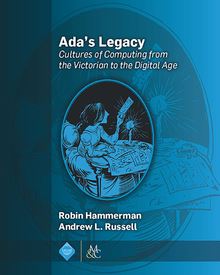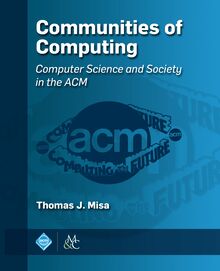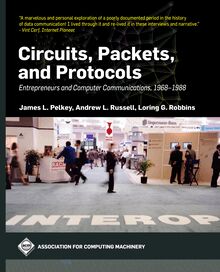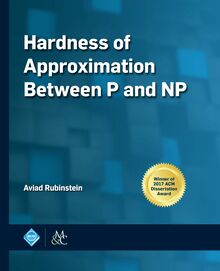-
 Univers
Univers
-
 Ebooks
Ebooks
-
 Livres audio
Livres audio
-
 Presse
Presse
-
 Podcasts
Podcasts
-
 BD
BD
-
 Documents
Documents
-
- Cours
- Révisions
- Ressources pédagogiques
- Sciences de l’éducation
- Manuels scolaires
- Langues
- Travaux de classe
- Annales de BEP
- Etudes supérieures
- Maternelle et primaire
- Fiches de lecture
- Orientation scolaire
- Méthodologie
- Corrigés de devoir
- Annales d’examens et concours
- Annales du bac
- Annales du brevet
- Rapports de stage
La lecture à portée de main
Vous pourrez modifier la taille du texte de cet ouvrage
Découvre YouScribe en t'inscrivant gratuitement
Je m'inscrisCircuits, Packets, and Protocols , livre ebook
Découvre YouScribe en t'inscrivant gratuitement
Je m'inscrisEn savoir plus
Vous pourrez modifier la taille du texte de cet ouvrage
En savoir plus

Description
As recently as 1968, computer scientists were uncertain how best to interconnect even two computers. The notion that within a few decades the challenge would be how to interconnect millions of computers around the globe was too far-fetched to contemplate. Yet, by 1988, that is precisely what was happening. The products and devices developed in the intervening years—such as modems, multiplexers, local area networks, and routers—became the linchpins of the global digital society. How did such revolutionary innovation occur? This book tells the story of the entrepreneurs who were able to harness and join two factors: the energy of computer science researchers supported by governments and universities, and the tremendous commercial demand for Internetworking computers. The centerpiece of this history comes from unpublished interviews from the late 1980s with over 80 computing industry pioneers, including Paul Baran, J.C.R. Licklider, Vint Cerf, Robert Kahn, Larry Roberts, and Robert Metcalfe. These individuals give us unique insights into the creation of multi-billion dollar markets for computer-communications equipment, and they reveal how entrepreneurs struggled with failure, uncertainty, and the limits of knowledge.
Sujets
Informations
| Publié par | Association for Computing Machinery and Morgan & Claypool Publishers |
| Date de parution | 19 avril 2022 |
| Nombre de lectures | 0 |
| EAN13 | 9781450397285 |
| Langue | English |
Informations légales : prix de location à la page 0,7194€. Cette information est donnée uniquement à titre indicatif conformément à la législation en vigueur.
Extrait
Advanced Praise for Circuits, Packets, and Protocols
“The key technologies that brought us our modern networked society—routers, packet switching, multiplexers, Internet protocols—were all invented by people in the short period between 1968 and 1988. James L. Pelkey interviewed these people at that time and recorded their stories. This book is the result: a detailed and up-close personal history of a world being born. Fascinating.”
- W. Brian Arthur, Author of The Nature of Technology: What It Is and How It Evolves
“Data communications is a complex ecosystem with a host of interrelated components: technology, markets, government and commercial entities, individual contributors, etc. Add the external influence of semi-conductors, personal computers, and venture capital starting in the late 60s, and its intricacy discourages comprehensive commentary. Circuits, Packets, and Protocols delves into this milieu and creates a coherent narrative which brings order and reasoning to its complexity. As personal, institutional, and technical relationships are put in context, a revolutionary period of advancement resulting in pervasive influence of 21 st Century society can be appreciated and understood from a logical, evolutionary perspective.”
- Charles Bass, Co-founder, Ungermann-Bass
“A carefully researched work that significantly benefits from the many interviews that enlighten the complexity of the crosscurrents and decisions made by entrepreneurs, technologists, and regulatory, legal, and legislative participants at the time. A window on what was the beginning of the foundation for all of the myriad apps and resources made available by todays networks.”
- Art Carr, Retired CEO, Codex Corporation
“A marvelous and personal exploration of a poorly documented period in the history of data communication! I lived through it and re-lived it in these interviews and narrative.”
- Vint Cerf, Internet Pioneer
“Our ability to communicate with a computer, later the existence of the Internet, was not inevitable. This book provides the best and most detailed history of how computers were given the ability to talk to each other, about how we—billions of us—were given the possibility of doing the same. These authors have written one of the most important histories of information technology that will remain an essential source for decades.”
- James Cortada, Senior Research Fellow, Charles Babbage Institute
“As the three bricklayers working side by side varyingly reported ‘I am laying bricks,’ ‘I am building a wall,’ and ‘I am helping to build the world’s greatest cathedral,’ so might the tech laborers revealed in the successive pages of this book have progressively answered ‘We are making these two computers talk to one another,’ ‘We are making a network of computers that can span the world,’ and ‘We are helping to improve human communications.’ This book does a remarkable job of describing our attempts to harness computers for purposes of communication. Thank you for telling our story.”
- Dr. John Davidson, Successively an ALOHANET and ARPANET technologist, a LAN and Internet entrepreneur, and now an investor in communication startups
“In 1968, an FCC decision to open telecom networks unleashed technology entrepreneurs and by 1988 the underpinnings were set for digital pervasiveness. Mr. Pelkey chronicles this critical 20-year period and the people, companies, and technologies that formed the foundation for today’s information ubiquity.”
- Charles DiSanza, retired security analyst and former Institutional Investor magazine “All Star Analyst”
“This book is an impressive tour de force on the co-evolutionary stories of the computer and telecommunication industries and their convergence. It is a must-read for all scholars interested in the roots of the contemporary information-based techno-economic system. It is not only a story of industrial evolution but also of its embedding into institutional and policy dynamics. It is written by a practitioner of the industry, but without self-serving aims or mythology about the legend of the ‘heroic entrepreneurs’ in their garages. Indeed, it is a much more rigorous contribution to industrial history and economic theory than those of most academics.”
- Professor Giovanni Dosi, Institute of Economics, Scuola Superiore Sant’Anna, Pisa
“This book reveals both the intricacies of the emerging networking market and the complexities of the brilliant individuals who created it.”
- Esther Dyson, Investor
“ Circuits, Packets, and Protocols is historical, technical, and a good read for anyone wishing to understand how the Silicon Valley/Internet/Information Age came about. Most sources come at this history from one point of view. Here the authors have investigated several phenomena and have looked at how they intersected. Although they have emphasized the infrastructure and entrepreneurship leading to the Digital Age, they have also investigated the impact of such things as government funding, regulations, academic participation, protocol development, venture capitalism, market acceptance, cost reduction, miniaturization, and information digitization. They have then given a comprehensive overview of how all of these worked together to create the information infrastructure we all use today. The book is not all about ‘winners’ either but includes the story of ‘losers’ as well, and what can be learned from failures as well as successes. Both the references and many associated oral histories give the book credence and make this a seminal work of history. If you wonder whether there was a one-time confluence of events that brought us to the Digital Age, or a pattern we can learn from and pursue, this book will help you decide.”
- Elizabeth (Jake) Feinler, Director of Network Information Systems Center, Stanford Research Institute, 1972–1989
“At the core of a technological revolution is the self-winding process of innovation, in which an answer to a challenge raised by practical need is accepted by virtue of becoming the foundation for new need and associated markets. Yet, what in hindsight appears unstoppable was at the time far from foregone conclusion. Thus, on another, perhaps more fundamental level, the book is a vivid tribute to the enigmatic figure of the entrepreneur, the soul of innovation. Whether in the realm of venture capital, commerce, government, or education, the entrepreneur shows up as the ultimate interdisciplinary pragmatist, the alchemist who marshals human and economic capital bound together by technical vision in pursuit of the ultimate goal: the creation of reality.”
- Walter Fontana, Harvard University
“A remarkable history of the first two decades of the data communications industry, based on a unique set of insider interviews.”
- Dave Forney, Modem Pioneer
“The authors take you on an astounding journey into the origins of the Digital Revolution. They help you understand how the entrepreneurs, technicians, bureaucrats, and the military cooperated, competed, and finally succeeded in creating some of the most interesting electronic dimensions of our modern society.”
- Louis Galambos, Research Professor, The Johns Hopkins University
“Pelkey, Russell, and Robbins have produced a monumental treatise on the origins of human and computer communication during the two-decade period from 1968 to 1988. For any professional who wants to understand the computer and human communication world prior to the Internet, this book is required reading.”
- Burton Grad, Software History Center, Computer History Museum
“By the late 1960s computers had improved immensely. However, transmitting data from one digital device to another was very awkward. Communicating between remote locations was even worse. It was not uncommon to send data to a remote location with a courier carrying a box of tape reels on a plane. It was clearly desirable to connect everything to everything, and this was a task of immense complexity. Circuits, Packets, and Protocols is a magnificent account of the myriad of independent developments it took to create the digital age. The book is based on interviews with most of the key people who made it happen. I helped fund a number of the computer communications ventures that contributed to the achievement, but until I read this book I appreciated only a small part of this world-changing accomplishment.”
- Stewart Greenfield, Co-founder, Oak Investment Partners
“ Circuits, Packets, and Protocols is a masterpiece of scholarship—of a rare and beautiful kind. The co-author, James L. Pelkey, was a practiced entrepreneur at a time when his investment needs led to meeting a panoply of inventors and entrepreneurs busily engaged in a game that many sensed, but too few recognized the true outlines. The astonishing and fortuitous fact for us is that Pelkey had the rare instinct to record oral interviews with 88 ‘significant people’ from 31 companies and organizations who were vying to ‘win the game.’ The game turned out to be networking connectivity —essentially the communications pivot upon which our entire global society operates today. Economics, politics, health, entertainment, education—all have been transformed by this networking fabric—and the reader will get to see ‘behind the curtain’ for how difficult this evolution was, how it came about, and who were the kingpin figures in it all.
Historians long eschewed the value of the oral interview of protagonists, noting that the approach all too easily devolves into self-aggrandizement and braggadocio, or worse, into self-denigration by key principals. But Pelkey’s immersive effort allows contrast and comparison, and importantly, gives glimpses of the doubts and frustrations of the protagonists during a tumultuous and conflicted evolution for which they themselves had yet to know the answers. The consequence is of especial historical note—this is not a work of hagiography, no pure view of the
-
 Univers
Univers
-
 Ebooks
Ebooks
-
 Livres audio
Livres audio
-
 Presse
Presse
-
 Podcasts
Podcasts
-
 BD
BD
-
 Documents
Documents
-
Jeunesse
-
Littérature
-
Ressources professionnelles
-
Santé et bien-être
-
Savoirs
-
Education
-
Loisirs et hobbies
-
Art, musique et cinéma
-
Actualité et débat de société
-
Jeunesse
-
Littérature
-
Ressources professionnelles
-
Santé et bien-être
-
Savoirs
-
Education
-
Loisirs et hobbies
-
Art, musique et cinéma
-
Actualité et débat de société
-
Actualités
-
Lifestyle
-
Presse jeunesse
-
Presse professionnelle
-
Pratique
-
Presse sportive
-
Presse internationale
-
Culture & Médias
-
Action et Aventures
-
Science-fiction et Fantasy
-
Société
-
Jeunesse
-
Littérature
-
Ressources professionnelles
-
Santé et bien-être
-
Savoirs
-
Education
-
Loisirs et hobbies
-
Art, musique et cinéma
-
Actualité et débat de société
- Cours
- Révisions
- Ressources pédagogiques
- Sciences de l’éducation
- Manuels scolaires
- Langues
- Travaux de classe
- Annales de BEP
- Etudes supérieures
- Maternelle et primaire
- Fiches de lecture
- Orientation scolaire
- Méthodologie
- Corrigés de devoir
- Annales d’examens et concours
- Annales du bac
- Annales du brevet
- Rapports de stage




















